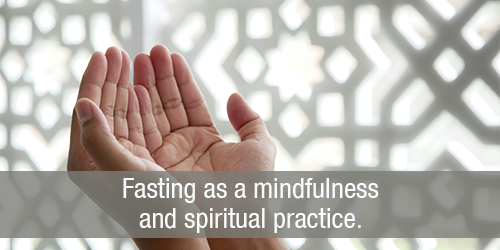I was fortunate to have had a global upbringing, so I’ve known many relatives, friends, and colleagues who fast as part of their various spiritual practices. This post is simply my humble attempt to share what I’ve learned about the mindful aspects of spiritual fasting. It is not an in-depth study of fasting or the health benefits and risks of fasting. Nor is it an attempt to compare and contrast different religious practices or an opinion about whether people should fast or not, as that is clearly a personal choice.
Fasting as a mindful eating experience
My early fasting experiences were more mindful than spiritual. I noticed I was more concerned about hunger before the fast even started. Once I was in the flow of my day and mentally occupied, hunger took care of itself.
Physically, I was surprised to find myself feeling more energized despite less food and my workout performance was actually better. My taste buds were ready and much more appreciative of the flavors of the next meal. Yet because I deliberately tuning into my body, I was able to respect my stomach’s need for the right amount of food to feel good. I enjoyed the meal without overeating or guilt.
The spiritual practice of fasting
 I am passionate about mind-body medicine and as I discover spirituality for myself, I have a deepening respect for the wisdom of ancient spiritual practices. As an Endocrinologist in India, I have many patients who fast for Ramadan, so I wanted to explore the spiritual practice of fasting.
I am passionate about mind-body medicine and as I discover spirituality for myself, I have a deepening respect for the wisdom of ancient spiritual practices. As an Endocrinologist in India, I have many patients who fast for Ramadan, so I wanted to explore the spiritual practice of fasting.
Spiritual fasting takes many forms, with variables such as which foods or meals are given up, how many hours or days one fasts, and how often.
Ramadan is the annual Islamic holy month of fasting, where practicing Muslims refrain from intake of any food or drink from sunrise to sunset. Mindful speech, thought, and action are also expected.
There are many other examples of fasting in religious and spiritual practices. Here are just a few brief examples.
In Judaism, fasting is total abstinence from (or a significantly reduced intake of) food and drink on six designated days of the year. Catholics may give up certain foods during the month of Lent. In Hinduism, certain foods may be given up for certain days of the week or during holy periods. In Buddhism, monks and nuns do not eat after the noon meal as a form of daily discipline. Observant Jains practice an eight day water-only fast once a year.
Potential spiritual benefits of fasting
There are many potential spiritual benefits of fasting:
- By diverting focus from the distractions of the outside world, one can train the mind to satisfy its appetite through increased prayer and contemplation of God.
- Fasting intensifies spiritual experiences and meditative practices.
- Food cravings and hunger pangs may be experienced as impermanent, earthly, and even irrelevant, similar to other thoughts and emotions that come and go.
- Fasting provides a clearer appreciation of the mind and body.
- Bodily and worldly needs take a backseat to the care of the soul and spirit.
- Attention is focused on one’s connection to God and on prayer to strengthen that connection.
- Hunger reminds one of their dependence and rekindles gratitude for one’s blessings.
- Breaking the fast is a celebration of the abundance in life.
- Sharing food at the end of the fast helps promote compassion, unity, humility, and generosity.
For me spiritual fasting, like eating mindfully, helps align body, mind, and spirit, and develop a sense of gratitude, humility and fellowship.
I’m interested in learning more and I’d love to hear about your personal experiences with fasting. Please share your comments below.
 Dr. Roshani Sanghani MBBS (Bom), MD Endocrinology, Diabetes and Metabolism (USA), Founder Reisaan Health and Aasaan Health LLC
Dr. Roshani Sanghani MBBS (Bom), MD Endocrinology, Diabetes and Metabolism (USA), Founder Reisaan Health and Aasaan Health LLC
Hello! As a practicing endocrinologist, I take a lifestyle-first approach to help my patients incorporate positive lifestyle changes that allow them to achieve better health with less medication. It has become my passion to help patients get back in touch with their inner wisdom. The Am I Hungry? Mindful Eating approach increases mindfulness in daily life, even in areas that aren’t about food! In the ten years since I discovered this program, I haven’t found a better way of helping people heal their relationship with food through mindfulness. I can’t recommend it enough. It changed me as a physician, parent, and person, and I know I am able to help my patients at a deeper level because of what I learned from facilitating this program.


6 thoughts on “The Spirituality and Mindfulness of Fasting”
Very interesting post. Thank you!
Dear Ms. Roshani,
Thank you for your great article. I took a lot of notes on important things you noted towards the end. I used to be an overeater for 15 years and failed many attempts to fast. Then, one day, it just came to me that mindfulness was going to solve my problem. I knew it in my deepest heart of hearts that mindfulness was going to work. I read a book about it, but halfway through the book, I still overate. I talked to my therapist about it. She said we worked on mindfulness before. She gave me readings before. I told her that it’s one thing to read something and another thing to apply it to daily life. So she told me to focus on the sights, sounds, and feelings of the present moment. She told me to close my eyes and tell her what I heard at that moment. If it wasn’t for her, I would never really get what mindfulness really was even after knowing all the words in the definition. I started savoring my food and only choosing one piece of veggie fish or only one grape and taking small bites. Food started tasting better, and the miracle was that I wasn’t hungry after savoring my one piece of food. Now I am interested in mindfulness fasting, so I googled that and came across your article. I feel like mindfulness will also be the secret to fasting.
If I had to summarize what you’ve written without looking at my notes, I would say that fasting is a good way to align the body, spirit, and mind, and that it’s easy to overcome the compulsions to eat because they are transient, and I can focus on connecting to my higher source and let that dominate, pray. Although I don’t really know how to pray for long periods and grow tired of it after a while and stop. Also, I took from your writing to look forward to the next meal, whenever that might be, even if it’s after fasting. That sounds like a really good savoring, cherishing, and mindfulness technique.
So I ate a grape for breakfast this morning, and was hoping to fast at least for lunch and dinner today. But if I had to plan my next meal, I would want it to be in three days, and it’ll be a small piece of something like one grape if there are anymore left in three days. Or one lemon wedge.
So now, I also want to incorporate mindfulness in to every single little task that I do, but of course it starts with fasting and might spread. This morning I practiced mindfulness by not going away to somewhere else until I finished the video on poverty that I started. I was really distracted to want to watch my uploaded video that I was waiting to be processed, so the video on poverty was just started to kill time, but I grounded myself and made sure I finished the hour-long video.
Thanks again for your insights. It gives me a lead on where to go and how to start my mindfulness fast.
Comments are closed.